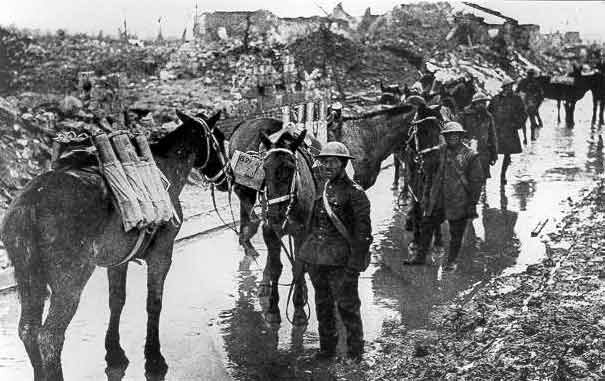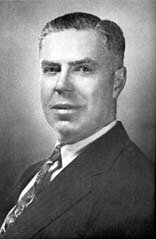
![]() American ammunition column near Vimy in France, 1918
American ammunition column near Vimy in France, 1918
 "Not only was our entry into the World War a calamity of the first magnitude for Europe and contemporary civilization, it was also a serious disaster for the United States."
"Not only was our entry into the World War a calamity of the first magnitude for Europe and contemporary civilization, it was also a serious disaster for the United States."
The American historian and sociologist Harry Elmer Barnes (PICTURE RIGHT) (1889-1968) is generally regarded as the founding father of historical revisionism.
Professor Barnes authored scores of books and hundreds of articles, which take up forty-seven pages of listings in his biography. Nowadays he is regarded as an controversial thinker. He became convinced by the early publication of previously secret documents and memoirs that great injustice had been done to Germany by the Versailles treaty. Later, after the Second World War, Barnes claimed that Roosevelt entered that war through a backdoor policy which involved provoking Japan.
Barnes was of Churchill, but they shared some thoughts on how the world should be run.
From The World War of 1914-1918, that Barnes wrote in 1939, we hereby quote the end of the last paragraph:
By prof Harry Elmer Barnes
Far from making the world safe for democracy, the World War of 1914 succeeded in putting democracy in greater jeopardy than at any other time since the collapse of the Revolutions of 1848.
In the place of the eighteen national states in Europe in 1914, we have had since 1918 some thirty national states, just as arrogant in their patriotism as those of the pre-war era. The League of Nations was, for more than a decade, nothing more than a league of victors. And since this Versailles policy has been challenged the League evaporated to little more than an impotent formality. The shocks administered by Japan, Italy, and the Spanish Civil War destroyed its vitality.
Imperialism did not disappear. Only the German colonial empire was destroyed. Financial imperialism started up again on a new and unprecedented scale right after the World War, ending up in tremendous defaults and disastrous losses to gullible investors. Militant colonialism reasserted itself in Japan and Italy. More nations have come into being and most of them have erected even higher tariff walls. Even Great Britain has abandoned its pre-war free trade policy. Economic nationalism is better entrenched today than it was in 1914.
It was generally believed in 1917 and thereafter that the intervention of the United States in the World War on the side of the Allies saved human civilization. It was lauded as one of the most noble and fortunate episodes in the history of man on the planet. Today, there is a great deal of skepticism about any such judgment. There is a tendency now to see in American intervention one of the major calamities in modern historya calamity for the Allies and the United States as well as for the Central Powers.
Let us assume the worst possible result of American neutrality in 1917-18. If we had not gone into the war the worst imaginable result would have been a German victory. But no sane person can very well conceive that the world would be any worse off today if the Germans had won under the Hohenzollerns.
We used to picture the horrors of a Germany and a Europe dominated by the Crown Prince and his followers. But, compared to Hitler, Mussolini and Company, the Crown Prince and his crowd now appear to be cultivated gentlemen, urbane democrats, and sincere pacifists. A more warlike world than the present could hardly have been created as a result of German victory, and certainly the economic situation in Europe since 1918 would have been far better under a Europe dominated by monarchist Germany.
But there is hardly a remote possibility that Germany would have won the war, even if the United States had not come in on the side of the Allies. Germany was eager to negotiate a fair peace arrangement at the time when Roy Howard's "knock-out victory" interview with British war-secretary Lloyd George put an end to all prospect of successful negotiations. We now know that the Lloyd George outburst was directly caused by his assurance that the United States was surely coming in on the side of the Allies. Had Wilson remained strictly neutral, there is little doubt that sincere peace negotiations would have been actively carried on by the summer of 1916.
There is every reason to believe that the result of American neutrality throughout the European conflict would have been the "peace without victory," which Woodrow Wilson described in his most statesmanlike pronouncement during the period of the World War. We would have had a negotiated peace treaty made by relative equals. This would not have been a perfect document but it would certainly have been far superior to the Treaty of Versailles.
Had we remained resolutely neutral from the beginning, the negotiated peace would probably have saved the world from the last two terrible years of war. Whenever it came, it would have rendered unnecessary the brutal blockade of Germany for months after the World War, a blockade which starved to death hundreds of thousands of German women and children. This blockade was the one great authentic atrocity of the World War period. In all probability, the neutrality of the United States would also have made impossible the rise of Mussolini and Hitlerproducts of post-war disintegration and the coming of a second world war.
Not only was our entry into the World War a calamity of the first magnitude for Europe and contemporary civilization, it was also a serious disaster for the United States.
During the first Wilson administration an impressive program of social reform had been introduced, widely known as "The New Freedom." Had this continued until March, 1921, enormous and permanent improvements might have been made in the political and economic system of the United States. But when Wilson allowed himself to be slowly but surely pushed into war, the New Freedom perished overnight. Reaction and intolerance settled down on the country. Some of those who had earlier warmly supported Wilson's domestic policies were thrown into prison, and many others were bitterly persecuted.
![]() Click to read the complete text of Barnes' The World War of 1914-1918.
Click to read the complete text of Barnes' The World War of 1914-1918.
![]() Click here to read Winston Churchill's words on the same matter.
Click here to read Winston Churchill's words on the same matter.
![]() Click here to read Barbara Tuchman's essay on how America entered the Great War.
Click here to read Barbara Tuchman's essay on how America entered the Great War.
![]() Click here for a picture slide show of the American Expeditionary Force in Europe in the Great War.
Click here for a picture slide show of the American Expeditionary Force in Europe in the Great War.
![]() To the frontpage of The Heritage of the Great War
To the frontpage of The Heritage of the Great War